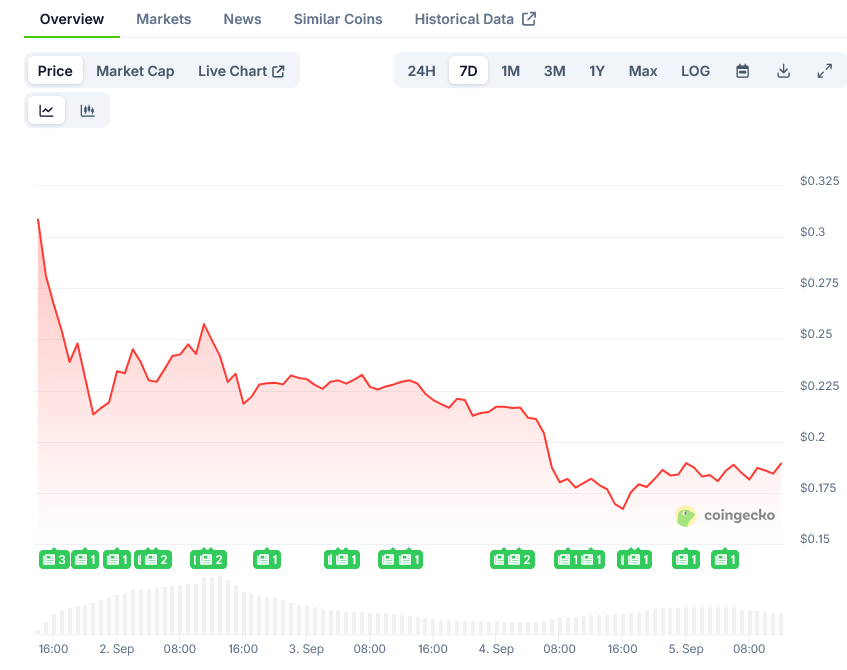The WLFI token from World Liberty Financial experienced a dramatic price drop, falling by 50% to $0.16 after developers took the unusual step of blacklisting Justin Sun’s wallet. This action froze billions of tokens associated with the Tron founder, sending shockwaves through the crypto community.
The blacklisting came after blockchain data revealed suspicious token movements from Sun’s wallets. According to Arkham data, Sun transferred approximately 50 million WLFI tokens worth $9.12 million to a new wallet shortly before the blacklisting occurred.
On-chain analysis also showed Sun deposited over 5.28 million WLFI (worth $1.19 million) into HTX exchange over a two-day period. This activity raised concerns about potential market manipulation.
Despite the evidence of these transfers, Sun dismissed the claims. He stated these transactions were merely “routine tests and address splitting” with no actual buying or selling involved.
Sun argued such movements could not have affected WLFI’s market price. However, the token’s value continued to decline following these events.

Blockchain records show Sun’s involvement with WLFI is extensive. He reportedly spent $75 million to acquire approximately 3 billion WLFI tokens in total.
Of this amount, Arkham data confirms Sun currently controls about 595 million unlocked WLFI worth $107 million at current market prices. This represents roughly 20% of his total holdings.
The remaining 2.4 billion WLFI tokens associated with Sun remain locked under vesting schedules. World Liberty Financial’s decision effectively froze both his unlocked and locked allocations.
WLFI launched with considerable hype and extremely high trading volumes. In its first hour of trading, volume surpassed $1 billion while the price dropped steeply from $0.40 to under $0.20.
This pattern of heavy selling pressure during a high-profile launch raised eyebrows throughout the crypto community. Many questioned whether large holders were selling into the initial demand.
The blacklisting decision has deeply divided the WLFI community. Many supporters argue the move was necessary to protect the token from market manipulation by large investors.
Critics, however, point to the action as evidence of dangerous centralization within the project. They contend that developer control over blacklisting contradicts WLFI’s claims of decentralized governance.
Justin Sun (@justinsuntron) has deposited 5.289M $WLFI, worth $1.19M into #HTX over the past 2 days.
Justin has spent $75M to buy 3B $WLFI and received 600M $WLFI as a token unlock.
Address: 0x5ab26169051d0d96217949adb91e86e51a5fda74
Data: @nansen_ai pic.twitter.com/KTOOchpT66
— Onchain Lens (@OnchainLens) September 3, 2025
The controversy expanded when HTX—a platform with connections to Sun—began offering 20% APY on WLFI deposits. This raised questions about whether user funds were being used to meet significant withdrawals or suppress prices on other exchanges.
An additional concern emerged regarding token distribution. Though only 6.8% of WLFI’s supply was officially unlocked at launch, actual trading suggested much greater liquidity. This hinted at selling pressure from a few large insiders.
The incident highlights vulnerabilities in token launches related to concentrated ownership and power dynamics. It serves as a reminder of the challenges facing token holders even in projects claiming community orientation.
As of the latest reports, the WLFI price has recovered slightly to $0.18, but remains over 15% down from previous trading levels. The token continues to trade on major exchanges including Binance, despite the controversy.
World Liberty Financial’s unprecedented move to blacklist a high-profile industry figure’s wallet suggests the project intends to maintain tight control over its token ecosystem as WLFI trading continues to evolve.
The price action in the days ahead will be closely watched by traders and investors assessing the long-term implications of this unusual intervention in the market.
The post World Liberty Financial (WLFI) Price: Token Falls 50% After Justin Sun Wallet Blacklisted appeared first on Blockonomi.
Also read: Solana and XRP struggle to impress while experts rank Remittix the best crypto to buy in September